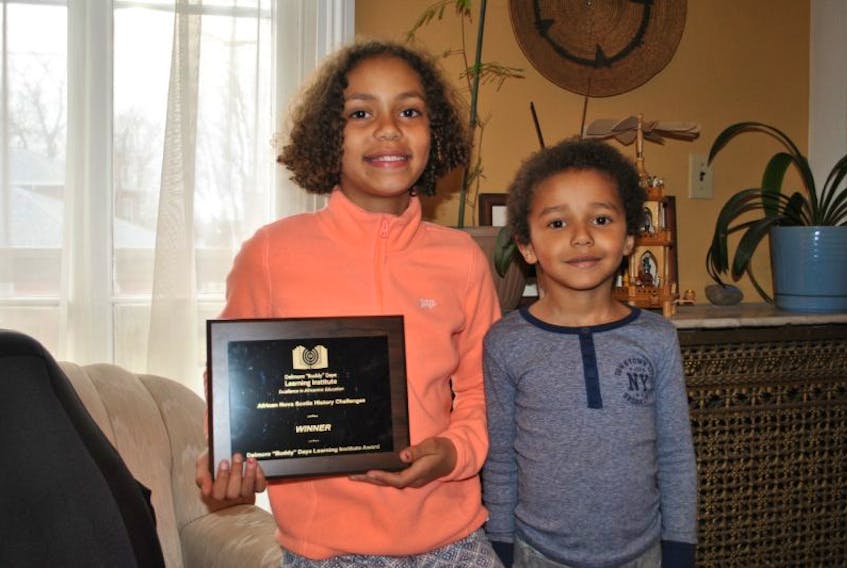“We should always remember Viola Desmond and what she stood for and never forget, because if we do, then we’re taking the risk to go back to those ways,” said the Grade 5 student at West Pictou Consolidated School.
Dlamini, who lives in Pictou, recently made a short film about Desmond as part of the 2017 African Nova Scotian History Challenges and Awards, an initiative of the Delmore “Buddy” Daye Learning Institute.
She won an award for the video, which depicted the incident that took place in New Glasgow in 1946 when Desmond, a black woman from Halifax, was arrested for sitting in an area of the Roseland Theatre designated for whites only.
Dlamini and her family members re-enacted the event, telling the story of how Desmond experienced car troubles while travelling through New Glasgow and decided to watch a movie to pass the time while her vehicle was being repaired. The video also explains how Desmond fought against the racism she experienced.
“I respect Viola Desmond because she proved in 1946 that black people can stand up for their rights no matter what the laws say because those laws were unfair,” said Dlamini, adding that all people deserve equal treatment.
She said she entered the contest because she heard there was a prize, and because she’s interested in history. “I think it’s important because it gives kids a chance to learn about history and to have fun doing it by choosing what they want to do, and being recognized for it is really neat too,” said Dlamini.
“I worked really hard on it, and it made me feel proud of my work. I like making films and stuff. Just to win something for doing something I love is nice.”
Dlamini received a plaque and cash prize for her efforts.
The DBDLI Awards for Excellence in African Nova Scotian History are presented to students whose submissions best exemplify contributions African Nova Scotians have made to the history, heritage and culture of the province and country, with the goal of encouraging discussion about African Nova Scotian history.
Dlamini’s mother Stacey said she’s pleased and proud of her daughter, as she put a lot of effort into making the video.
“It’s important to us that our kids have a deep appreciation for African Nova Scotian history in particular,” she said, noting that Trinity and her brother Khaya were born in South Africa, where her husband Buhle is from. “It’s really important to understand the journey of people who look like you and have been in this space longer than you.”
Stacey, who grew up in Pictou County and moved back three years ago, said she and Buhle want their children to understand the impacts of discrimination and having to fight for rights.
“We should always remember Viola Desmond and what she stood for and never forget, because if we do, then we’re taking the risk to go back to those ways,” said the Grade 5 student at West Pictou Consolidated School.
Dlamini, who lives in Pictou, recently made a short film about Desmond as part of the 2017 African Nova Scotian History Challenges and Awards, an initiative of the Delmore “Buddy” Daye Learning Institute.
She won an award for the video, which depicted the incident that took place in New Glasgow in 1946 when Desmond, a black woman from Halifax, was arrested for sitting in an area of the Roseland Theatre designated for whites only.
Dlamini and her family members re-enacted the event, telling the story of how Desmond experienced car troubles while travelling through New Glasgow and decided to watch a movie to pass the time while her vehicle was being repaired. The video also explains how Desmond fought against the racism she experienced.
“I respect Viola Desmond because she proved in 1946 that black people can stand up for their rights no matter what the laws say because those laws were unfair,” said Dlamini, adding that all people deserve equal treatment.
She said she entered the contest because she heard there was a prize, and because she’s interested in history. “I think it’s important because it gives kids a chance to learn about history and to have fun doing it by choosing what they want to do, and being recognized for it is really neat too,” said Dlamini.
“I worked really hard on it, and it made me feel proud of my work. I like making films and stuff. Just to win something for doing something I love is nice.”
Dlamini received a plaque and cash prize for her efforts.
The DBDLI Awards for Excellence in African Nova Scotian History are presented to students whose submissions best exemplify contributions African Nova Scotians have made to the history, heritage and culture of the province and country, with the goal of encouraging discussion about African Nova Scotian history.
Dlamini’s mother Stacey said she’s pleased and proud of her daughter, as she put a lot of effort into making the video.
“It’s important to us that our kids have a deep appreciation for African Nova Scotian history in particular,” she said, noting that Trinity and her brother Khaya were born in South Africa, where her husband Buhle is from. “It’s really important to understand the journey of people who look like you and have been in this space longer than you.”
Stacey, who grew up in Pictou County and moved back three years ago, said she and Buhle want their children to understand the impacts of discrimination and having to fight for rights.
Delmore “Buddy” Daye
The Delmore “Buddy” Daye Learning Institute is dedicated to excellence in Africentric educational research and practice, with a mission to advancing the academic achievement of African Canadian learners and educators.
Delmore “Buddy” Daye was born in New Glasgow in 1931. As a young man, he moved to Halifax and became a merchant mariner. He first came to public attention as a champion boxer. Always a popular and prominent member of Halifax’s African Nova Scotian community, he was involved in the formation of the city’s Neighbourhood Centre, where he became program director for youth.
A firm believer that violence gets you nowhere, he negotiated with bitter and frustrated young African Nova Scotian leaders and followers to seek solutions to their employment and living problems. In 1971, he was appointed manager of Province House and on Jan. 1, 1990, he became the first African Nova Scotian to hold the post of Sergeant-at-Arms. Outside of his responsibilities, he was a director of the Black United Front, a member of the Halifax Athletic Commission, a member of the Mental Health Association, and a member of the Company of Young Canadians. After his death in 1995, Halifax renamed Gerrish Street between Gottingen and Maynard Streets to Buddy Daye Street.
Source: Delmore “Buddy” Daye Learning Institute









